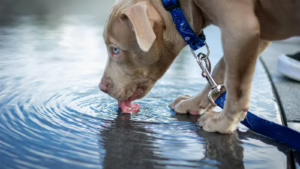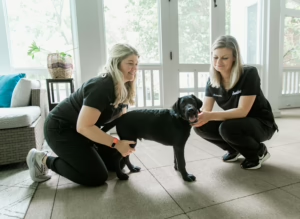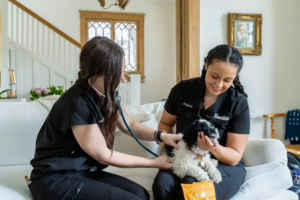According to the American Veterinary Medical Association (AVMA), here are the top reasons why you need to vaccinate your pet:
1. Vaccinations prevents or reduces the severity of a wide range of pet illnesses, including rabies, distemper, parvo, influenza, and Canine Infectious Respiratory Disease Complex (aka Kennel Cough).
2. Vaccinations can help avoid costly hospitalizations and treatments for preventable diseases.
3. Vaccinations prevent diseases that can be spread among animals and from animals to people, protecting overall public health.
4. Reputable pet boarding, daycare, and training services require vaccinations against certain diseases to protect all participating animals.
5. Many local and state laws require that household pets be vaccinated against certain diseases, even indoor-only pets.
Which vaccines does my pet need?
Core vaccines are those recommended for all pets regardless of lifestyle, unless there is a medical reason to not vaccinate.
The core vaccines we recommend for dogs – based on AVMA and AAHA guidelines – include canine parvovirus (CPV), canine distemper virus (CDV), canine adenovirus (CAV), and rabies.
The core vaccines we recommend for cats include feline panleukopenia (FPV), feline herpesvirus-1 (FHV-1), feline calicivirus (FCV) and rabies.
Noncore vaccines are those recommended for certain populations of pets based on lifestyle and geographic location. Noncore vaccines for dogs include influenza, leptospirosis, and Bordetella. Noncore vaccines for cats include feline leukemia (FeLV).
To view the guidelines at-a-glance, click the PDFs below!
Why do puppies and kittens require a series of vaccinations?
Just like a newborn baby, puppies and kittens need vaccines because of how vulnerable they are to serious diseases at a young age. While they do receive some protection through antibodies in their mother’s milk, that protection is not long-lasting. The recommended vaccine schedule provides them protection early in life, before they risk contact with harmful or life-threatening diseases.
As outlined by the AVMA,
“To provide the best protection against disease during the first months of life, your veterinarian will recommend a series of vaccinations, usually 2-4 weeks apart. For most puppies and kittens, the final vaccination in the series is given at about 4 months of age. Your veterinarian may adjust this schedule based on your pet’s circumstances and needs.”
Why do senior dogs and cats need vaccinations?
Elderly pets, just like elderly people, have poorer immune function. So while most pets can be infected regardless of age, vaccinations are crucial to protecting the health of senior dogs and cats. As they are the primary defense against serious illnesses, it’s important to stay consistent with your pet’s vaccine schedule as they age.
P.S. This is true for their oral health too!
How often does my pet need to be vaccinated?
After the initial puppy or kitten vaccine series is complete, most vaccines require a booster to be administered every few years. Others need to be renewed more often to maintain a level of immunity that will continually protect your pet. Some groomers and boarding facilities also require certain vaccines at certain intervals. It’s important to consult with your veterinarian and not to skip or delay recommended vaccinations, as this increases the risk of your pet becoming vulnerable to infection.
Not sure if your pet needs a vaccination? Give us a call and we’ll walk you through what vaccines your pet needs and when. The benefits of vaccinating your pet will almost always outweigh the potential risk. Plus, we’re only one home visit away to helping your pets live longer, happier, healthier lives!




